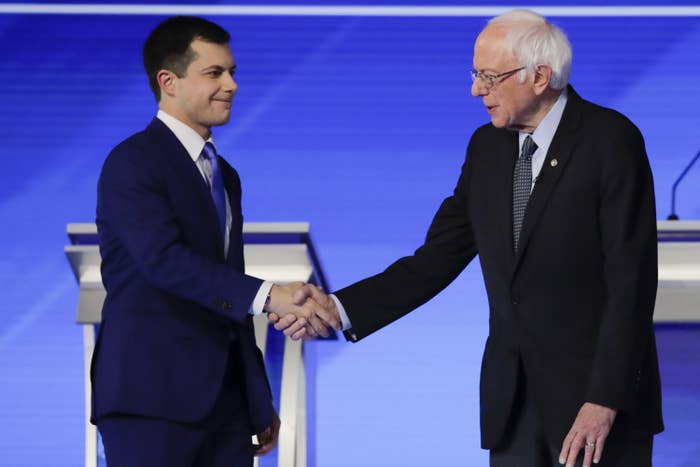
MANCHESTER, New Hampshire — Pete Buttigieg finally got the frontrunner’s treatment: One by one, his rivals at Friday’s Democratic presidential debate took their shots.
Their focus on Buttigieg, at times egged on by the moderators, reflected how serious a threat they now regard the former mayor from South Bend, Indiana.
Buttigieg earned a virtual split victory with Vermont Sen. Bernie Sanders in this week’s Iowa caucuses — a result that elevated Buttigieg over former vice president Joe Biden and others as a moderate or consensus-building alternative to Sanders, a democratic socialist. Almost as soon as the debate ended, a new poll of New Hampshire showed Buttigieg in a dead heat with Sanders.
“I don’t have 40 billionaires, Pete, contributing to my campaign,” Sanders charged during the second half of the debate, landing an attack he and his supporters had been telegraphing all day and meant to brand Buttigieg as beholden to corporate interests.
Biden got the pile-on started early, after some prodding from ABC News’ George Stephanopoulos, who noted Biden’s recently increased criticism of Buttigieg.
“Mayor Buttigieg is a great guy and a real patriot,” Biden began politely, nodding to Buttigieg’s military service in Afghanistan before pivoting to a reminder of the former mayor's struggles to register support among voters of color.
“He's a mayor of a small city who has done some good things, but has not demonstrated he has the ability to — and we'll soon find out — to get a broad scope of support across the support, including African Americans and Latinos.”
Minnesota Sen. Amy Klobuchar, who made the night’s most persistent case against Buttigieg, compared his inexperience in national politics to Donald Trump’s before he was elected president. “We have a newcomer in the White House,” she said, “and look where it got us.” She returned to that theme again in her closing statement, emphasizing that she’s “not a political newcomer with no record.”
There also was Massachusetts Sen. Elizabeth Warren, who bluntly answered “no” — before going into greater detail — when asked if she was satisfied with Buttigieg’s answer on racial inequities in the criminal justice system. Even hedge fund billionaire Tom Steyer got in on it, arguing the 38-year-old lacked the chops to take on Trump.
“We need people with experience,” Steyer said. “That’s why I’m worried about Mayor Pete. You need to be able to go toe to toe with this guy and take him down on the debate stage or we’re going to lose.”
Entrepreneur Andrew Yang was the only candidate on this stage to spare Buttigieg.
Buttigieg’s advisers had been preparing him for such confrontations for months. But with the exception of a few minor scrapes in November and Warren’s memorable eruption over Buttigieg’s now-infamous wine cave fundraiser in December, Buttigieg had never faced a sustained barrage of attacks.
Aides sensed that could change Friday, and Buttigieg quickly parried each attack before retreating to well-rehearsed sections of his usual stump speech. Though some of the incoming was sharp, no line seemed to rise to the immediate game-changing or instant-classic levels of past pre-New Hampshire primary debates. (Think Barack Obama’s “You’re likable enough, Hillary” or Chris Christie’s takedown of Marco Rubio in 2016.)
At one point Buttigieg even shared a kind exchange with Biden, on the question of whether investigations into the business dealings of Biden’s son, Hunter, would be problematic if the former vice president is the nominee.
“No,” Buttigieg replied firmly. “And we're not going to let them change the subject. This is not about Hunter Biden or Vice President Biden or any Biden. This is about an abuse of power by the president.”
“Look, the vice president and I and all of us are competing,” Buttigieg continued after applause, “but we've got to draw a line here. And to be the kind of president, to be the kind of human being who would seek to turn someone against his own son, who would seek to weaponize a son against his own father, is an unbelievably dishonorable thing that is just one more example of why we as a party have to be completely united in doing whatever it takes at the end of the day to make sure that this president does not get a second term.”
Biden was appreciative. “Look,” he said, “I thank my colleague for saying that.”
The clash between Sanders and Buttigieg could have a more lasting impact on where Democrats go in 2020. Earlier Friday, during a speech at St. Anselm’s Politics & Eggs series, Sanders criticized Buttigieg by name, riffing on headlines about the former mayor’s contributions from billionaires and setting up his line later that night. One of Sanders’s advisers, David Sirota, repeatedly tweeted about Buttigieg Friday, using the hashtag #PetesBillionaires and prodding him over his opposition to Medicare for All. His national press secretary was even sharper.
TF when more billionaires support you than Black people. 💵🤔 #DemDebate #PetesBillionaires
The Sanders–Buttigieg clash also carries pointed generational undertones. Sanders, at 78, is the oldest Democrat in the race. Buttigieg, at 38, is the youngest. And the generational split for Buttigieg and Sanders carries over to their supporters, too, but in reverse. In a new poll of likely Democratic voters in New Hampshire, NBC/Marist found that Sanders performed best with voters under 45, at 35% support, and Buttigieg performed best with voters over 45, at 24%.
The two are now running at the top of the pack in the state, with Buttigieg rapidly gaining support after he and Sanders came out ahead in Iowa. The Iowa results are not yet official, and the Associated Press has said it is not able to declare a winner due to irregularities after days of chaos in the state, but Sanders appears to be winning the raw votes while Buttigieg may ultimately have an edge on delegates.
Their improbable collision course began somewhat poetically 20 years ago when, as a high school senior, Buttigieg won the John F. Kennedy Profile In Courage essay contest for a piece he wrote on Sanders.
“Sanders’ courage is evident in the first word he uses to describe himself: ‘Socialist,’” Buttigieg wrote then. “In a country where Communism is still the dirtiest of ideological dirty words, in a climate where even liberalism is considered radical, and Socialism is immediately and perhaps willfully confused with Communism, a politician dares to call himself a socialist? He does indeed.”
At Friday’s debate, Buttigieg was asked if “socialism” could be a potent term that works against Democrats in the general election.
“I'm not interested in the labels,” Buttigieg responded, in a moment of conciliation. “I'm not interested in what Republicans are going to say.”
But he is. Or at least he was — not just when he wrote his 2000 essay, but as recently as a few months back, when he was courting moderate Iowa voters.
“They’ll try the socialist thing,” Buttigieg, who spent several years as a management consultant for McKinsey & Co., said last fall when discussing why Trump’s attacks won’t work on him. “But the thing is: I got started in the private sector.”

